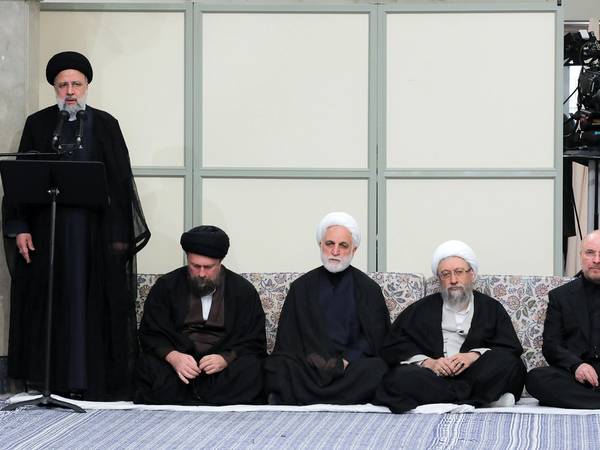Opinion - One week following Israel's targeted strike on the Iranian embassy in Damascus, resulting in the deaths of seven high-ranking Quds Force officers, Tehran appears undecided on its response.
President Ebrahim Raisi participated in an evening session of Iran's National Security Council shortly after the incident, yet no definitive actions were announced.
Following the extraordinary meeting, Iran dispatched a letter to the UN Security Council regarding Israel's attack, delivered by the nation's deputy representative to the United Nations. Apart from this diplomatic action, holding funerals, and engaging in extensive propaganda emphasizing martyrdom, the regime has refrained from further measures.
"Definitely, in connection with the attack on the Iranian consular building in Damascus, several meetings of the Supreme National Security Council have been held at the level of leaders" says the Raisi administration’s Minister of Sports and Youth. The recurrence of these meetings suggests an internal divide among security, military, and political leaders regarding the appropriate response to what Tehran perceives as a significant Israeli provocation. The absence of concrete action a week after the incident may also indicate underlying disagreements.
The Islamist government and its supporters faced a significant setback following the killing of Qasem Soleimani, compounded by the opposition's jubilation, praising Bibi Netanyahu as "the only friend in difficult times." Their reactions have been limited to mere promises of retaliation and statements from the Leader’s office vowing the destruction of Israel. While these actions may serve as propaganda tools, they fall short in alleviating the humiliation felt by the regime.
While IRGC circles continue to threaten a harsh retaliation, other regime circles, such as Friday Imams call for caution and “strategic patience. The publication of a claim that Mohammad Reza Zahedi, the top general killed in Damascus, was one of the planners of the October 7 Hamas attack partially reinforces the idea that revenge has already been taken and there is no need for further action.
This reluctance to respond indicates that the IRGC is further entrenching itself in its predicament. Tensions are escalating both internally and externally, with society increasingly resentful toward the authorities. The decision to forego a separate funeral for the deceased and instead incorporate their memorial into Friday prayers underscores this sentiment.
Any serious escalation and possibly a direct war with Israel, will deal a heavy blow to Iran’s beleaguered economy, a scenario probably loathed by many politicians within the clerical-military system. Already, the currency rial has fallen by 30 percent since early January, and now stands close to 650,000 to the US dollar.
Another significant hurdle to a military retaliation is the profound deficiency in Iranian intelligence operations within Syria, enabling the success of Israel's actions. Furthermore, as time elapses, the range of available but untapped options diminishes, complicating the decision-making process for a response. Since October 7, the foreign operations of the Quds Force have already exhausted some of their most readily deployable strategies, such as missile launches and assaults on commercial vessels.
Some believe that Israel has already given Iran’s rulers the opportunity for justifying inaction, by saying that the attack on the embassy in Damascus was a response to a serious attack on Eilat by Iran’s proxies. The panic-buying in Israeli supermarkets was also portrayed in Iranian government-controlled media as a victory without having fired a shot.
The opinions expressed by the author are not necessarily the views of Iran International
